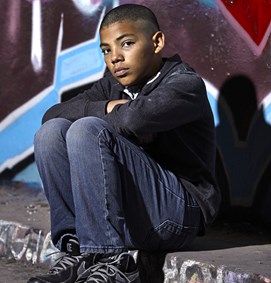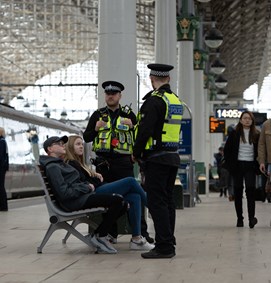The changing face of county lines – why it matters and what we’re doing about it
- Date: 17 August 2023
- In: UK
Six months later and the role of social media in the proliferation of county lines activity is still a major issue.
The BBC recently conducted an investigation into Snapchat being used by criminal gangs to recruit teenagers to move and sell drugs. After setting up a fake profile as a 15-year-old girl on the app, the undercover reporter found that access to drug-related content was readily available. They also interviewed a woman who had been recruited into a drug gang in south Wales as a teenager after accepting a friend request from a young man on Snapchat. Believing she was in a relationship with the man, she would help with drug dealing and soon found herself forced into repaying a ‘debt’ through sexual favours in return for free drugs.

In February, the Guardian reported that recruitment adverts appearing on social media sites such as Instagram and Snapchat that are designed to groom children and young people now resemble professional job adverts. The article said that children as young as seven years old were being lured into dealing drugs thinking they were genuinely going to be able to help their families. Since the Covid-19 pandemic and the cost-of-living crisis, many children are more susceptible to seeing these recruitment adverts as an opportunity to contribute to the family finances.
iNews also reported on how the cost-of-living crisis is impacting the way children and young people are being recruited into criminal gangs. The depressing reality is that the current economic climate has worsened this type of child exploitation by making it cheaper for abusers to groom young people into criminal activity. Whereas once abusers might have used the temptation of expensive technology such as the latest mobile phones, recent observations have shown that now hungry children living in poverty may be lured by simple rewards such as Subway sandwiches, vaping equipment, sweets and magazines.
As well as financial pressures, the latest education committee panel in July heard that young people are turning to criminal gangs for support and authority that is lacking at home or at school. Other contributing factors include a lack of mental health support, domestic violence, generational trauma, and the closure of youth centres leading to children falling into the wrong hands, especially after school.
County lines is a major form of child exploitation in the UK. This term refers to the transportation of illegal drugs from one area to another, often across local authority and police force boundaries, usually by children or other vulnerable people who have been coerced into complying. Urban gangs are able distribute and sell drugs in more rural and less populated areas via dedicated phone lines.
A common feature in county lines drug supply is the exploitation of young and vulnerable people. The dealers will frequently target children to act as drug runners or to move cash so they can stay under the radar of law enforcement. In some cases, the dealers will take over a local property, normally belonging to a vulnerable person, and use it to operate their criminal activity from. This is known as cuckooing or home invasion.
Children and young people exploited in this way will often be exposed to physical, mental and sexual abuse, and in some instances will be trafficked to areas a long way from home as part of the network's drug dealing business.
Children involved in criminal gangs often don't see themselves as victims or realise they have been groomed to get involved in criminality. But children cannot consent to their own exploitation. It's also often tough for children to exit this lifestyle as they are often in 'debt' to the criminal organisation who enforce violence and intimidation on them and their families. Often, the only way to repay this is to be forced to transport drugs or money.
Over the last decade or so, the UK has seen an increase in county lines gangs using the rail network to exploit children into trafficking drugs.
We have partnered with British Transport Police (BTP) to develop our Safeguarding on Transport programme. Through this, we’re training people who work in and around railway stations, including BTP, to be able to spot the signs of vulnerability which may mean a young person is the victim of exploitation and how to respond.
From the forms BTP officers fill in about each young person they identify as being at risk, we can assess the level of risk and vulnerability and offer the appropriate support.
We operate five projects across the country where we offer one-to-one support to young people and their families, as well as enabling us to be more visible to officers and our rail colleagues on the network and at stations. We regularly hold briefings with officers, participate in joint patrols, work closely with BTP on key operations and join in with station safety events.

But we can’t be everywhere all the time. We can reach many more children with the help of communities working as our eyes and ears – the more people using the rail network who know how to spot a vulnerable child or young person and what to do about it, the better.
With the support of our partners in the rail industry, we are creating a national safety network to protect vulnerable children on and around the UK's transport system.
We are currently establishing Safeguarding Action Groups at key stations across the UK. We are also working closely with BTP and other key industry partners to promote safety, raise awareness around the issues that young people face and highlight vulnerability across the rail network.
We give young people who have lost hope and direction, the belief, guidance and practical life skills to build a positive future and change their story for good. Our At Risk Right Here, Right Now Campaign provides important information about how to spot vulnerable children at UK railway stations. Take a look and learn how you can identify a vulnerable child next time you’re at a station, and what you can do to help them.
If you feel a child you know may be at risk of exploitation or is getting involved with county lines gangs, you can report your concerns to BTP by calling them on 0800 40 50 40, or text them on 61016. In an emergency, always call 999.